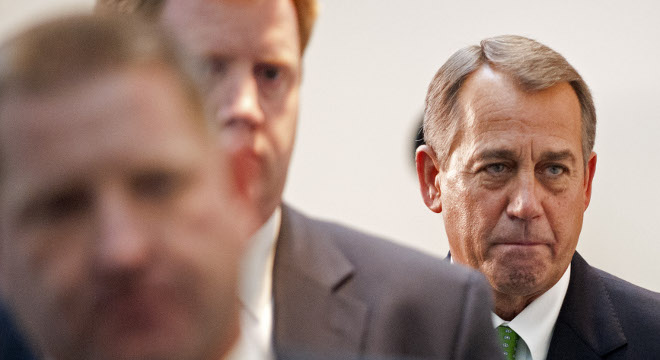Senate Democrats spent the latter part of the week building consensus amongst themselves on a plan to pay down the sequester that includes a mix of spending cuts and new taxes. Early reports from Democratic aides suggest they want to sub out a year’s worth of sequester cuts by reducing Medicare provider payments, defense spending, and farm subsidies; and increasing revenues from wealthy individuals and businesses in one of any number of politically advantageous ways. On their own, these measures would reduce deficits by about $120 billion over 10 years — about one tenth of the full sequester.
Once this plan is set in stone, Republicans will reject it out of hand for including revenues. Until then, they will continue to advance the peculiar claim that only they have a plan to avoid the sequester (to replace it with spending cuts, largely to social programs for the poor) and that Democrats do not.
Let’s examine that claim.
If there’s a narrow truth to it, it’s in the fact that Senate Democrats didn’t pass a bill last year to pay down or replace the sequester, and Republicans did. Widen the scope, though, and the accusation basically falls apart. Democrats actually have been pretty clear about how they’d like to pay down the sequester. Just this week, in fact, President Obama said his most recent budget offer to John Boehner remains active. Adjust it for the fact that Congress already enacted about half the revenue from that plan, what he’s offering isn’t just a sequester replacement plan Republicans claim doesn’t exist, but one that’s actually weighted more toward spending cuts than tax increases.
So it’s only by the most ungenerous standard that Democrats have no plan to avoid sequestration.
But the real irony is that, for the purposes of the current negotiation, Democrats actually have been much clearer than Republicans about how they’d like to pay down the sequester.
How can that be? If House Republicans have actually passed sequester replacement bills and Senate Democrats haven’t? Well as fond as John Boehner is of boasting that the House has acted and now the Senate should take it’s turn, it’s just not true anymore in any meaningful sense. The House’s most recent sequester replacement bill passed on December 20 and became defunct the moment the 112th Congress came to a close. There’s no active House bill to avert the sequester, and it’s not at all obvious that Republicans could pass one on their own in the next three weeks. They cleared the Spending Reduction Act by a vote of 215-209 two months ago, back when they had eight more members than they do right now.
Obviously, the goal of all this spinning isn’t to convey the legislative status quo to the public accurately. Instead it’s to dupe reporters and thought leaders into giving the GOP at least a partial pass until and after the administration orders the sequester next month. And honestly, as frustrating as it must be for Democrats, this sort of ref working is all in the game. The onus falls on the press to get this stuff right, not the GOP. Republicans and Democrats are each positioning themselves to blame the other for the sequester, and their efforts require convincing the press that the other party is acting less responsibly.
If we’re making normative judgments, I think the Democrats have a fairer claim to the mantle of responsible behavior. The Republican position is that the terrible sequester is preferable to compromising with Democrats or to entertaining even a thimble full of new revenues. Democrats don’t have this unreasonableness problem. But in building their case, Republicans are hoping the press gives them a freebie on the factual question of whether or not they have a plan to replace the sequester. They don’t anymore, and it’s not even clear that they could pass their old one if they tried.








